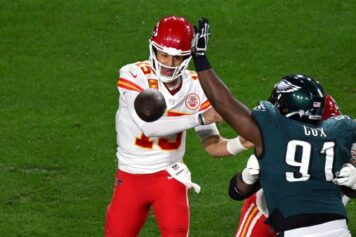If you’re not black, seeing racism in the exact same manner as an African Americans can be difficult. Even Americans of African descent differ among themselves as to exactly what racism is and how it manifests in our daily lives. When George Zimmerman was acquitted in the death of Trayvon Martin, former NBA star Charles Barkley went on record in agreement with the verdict.
“Well, I agree with the verdict,” Barkley told CNBC. “I feel sorry that young kid got killed, but they didn’t have enough evidence to charge him. Something clearly went wrong that night — clearly something went wrong — and I feel bad for anybody who loses a kid, but if you looked at the case and you don’t make it — there was some racial profiling, no question about it — but something happened that changed the dynamic of that night.”
When receiving backlash based on his comments, Barkley even claimed reverse racism from black people and the media. His opinions are contrary to my own and that of every black person that I know. And we all wish Chuck would just shut up and stick to basketball.
But if blacks cannot agree as to what the definition of racism truly is, then trying to prove its existence and virulence to the general population is clearly a task of Herculean proportions.
According to Webster’s Dictionary, the primary definition of racism is:
1. A belief or doctrine that inherent difference among the various human races determine cultural or individual achievement, usually involving the idea that one’s own race is superior and has the right to rule others.
2. A policy or system of government based upon fostering a racist doctrine.
Dimensions of racism are determined by the primary observer, and difficult to explain to a secondary observer who is not in the same mindset as the first. Some believe they are seeing a phenomenon that is relatively small when observing it, while others see it as the size of a boulder.
For those that know, and have ever experienced it, racism is like a sixth sense. Though it is hard to quantify intent without hard evidence, those sensitive to its effects often are those who have been exposed to it for a lifetime. Or they have some type of familial or intimate contact with individuals who have experienced it thus become tuned to picking up on it.
On February 11, middle aged white man, Michael Dunn was convicted on three counts of attempted second-degree murder and one count of firing a weapon into a vehicle in a case surrounding the death of 17-year-old African American Jordan Davis. The incident ironically took place in Jacksonville, Florida, only 120 miles from Sanford, Fla where Trayvon Martin was gunned down by George Zimmerman in 2012. According to courtroom documents, on the evening of November 23, 2013, Dunn fired ten shots into a SUV sitting at a gas station. Four African American teens were sitting in the vehicle. Dunn claims he asked the young men to turn down their music (which he described as “thug music”), and an argument ensued.
The defendant says after seeing what he thought was a gun barrel, he went to his vehicle, and brandished a firearm. Seeing this, the young men tried to drive away, but Dunn opened fire before they were able to do so. As the four men bled from gunshot wounds, Michael Dunn left, walked his dog, ordered a pizza, and had a drink. Jordan Davis was pronounced dead at the scene from a bullet that penetrated the rear door. Dunn would later say, to this day, that he feared for his life.
"You know I was thinking about that today, I was like I'm the f*** victim here, I was the one who was victimized," Michael Dunn said from jail in December 2012, a month after the shooting. "I mean I don't know how else to cut it, like they attacked me, I’m the victim. I'm the victor, but I was the victim too."
Conservative radio host and television personality Larry Elder – who is black – went on record with HLN in defense of Dunn, saying he was reasonably afraid for his life on the night in question.
In fear for his life with a semi-automatic handgun, and a handmade silencer in his vehicle? Laughable beyond reason.
The fact that Elder is an African American male is nausea inducing. But his reaction is a reality of the black experience in America. One in which elders of color readily blame African American youths for their own demise. While I can admit there are many circumstances where young brothers call death upon themselves with their actions, the case of Jordan Davis was not one of them.
Some feel as I do: Davis did not deserve to die. Even Juror #4, a white woman who goes by the name of “Valerie,” came forward to say that she wanted Dunn convicted. "We looked at a lot of evidence – and myself, it was where the gunshots were, the timing,” she said in an interview with ABC’s Nightline. “Could he have had other options? To me, [the shooting] was unnecessary."
However, the defense was able to craft an illusion where Dunn was this meek, mild-mannered citizen who was accosted by reckless youths. Youths that were menacing as their thug war music throbbed through the speakers. Youths who were most assuredly out searching for a victim to satisfy their wanton lust for violence. Of course I’m being facetious and absolutely disingenuous with that statement. But no more disingenuous than a hulking man with two weapons in his vehicle saying he was afraid of four teenagers. I am being no more facetious than a defense team that said to the judge and jury that Dunn’s actions were not racially motivated.
Speaking at a press conference before the verdict, Dunn’s defense attorney, Michael Stolla said, “This is not a black-and-white issue. This is what he would call a subculture-thug issue. It’s not about race.”
Based upon his statements in letters sent while awaiting trial and a televised interview with a next-door neighbor who claimed he witnessed Dunn’s disdain for blacks and Hispanics on several occasions, Michael Dunn appears to have been a proud racist. But none of that information was mentioned at the trial by the prosecutors. As was the case in the George Zimmerman trial, the prosecutors appear to have been afraid of bringing up the race issue. Perhaps it’s because proving racism to a predominately white jury, without the benefit of facts directly connected to the tragic incident, is nearly impossible. Everything else is speculation and, as far as a court of law is concerned, circumstantial.
Circumstantial Evidence (As defined by legal-dictionary.com):
Information and testimony presented by a party in a civil or criminal action that permit conclusions that indirectly establish the existence or nonexistence of a fact or event that the party seeks to prove.
Based upon this definition, proving racism as a catalyst in the shooting death of Jordan Davis was impossible. However, many Americans of African descent don’t need any external proof. For better or worse, we have an innate sensitivity to it. Being followed around by security while shopping, being pulled over by police for driving while black, the noticeable look of fear or concern that adorns the faces of older white folks whenever I am on an elevator or other confined space with them for a short period of time. To me, these are clear instances of racial prejudice or bias. However, they are feelings that are difficult to prove in a vacuum.
In the aftermath of the George Zimmerman trial President Barack Obama made an impassioned speech to the country and revealed some of the struggles he has had with racial prejudice as well by saying,
"There are very few African American men in this country who haven't had the experience of being followed when they were shopping in a department store. That includes me. There are very few African American men who haven't had the experience of walking across the street and hearing the locks click on the doors of cars. That happens to me — at least before I was a senator. There are very few African Americans who haven't had the experience of getting on an elevator and a woman clutching her purse nervously and holding her breath until she had a chance to get off. That happens often," he said in a surprise speech days after the Zimmerman not-guilty verdict. "And I don't want to exaggerate this, but those sets of experiences inform how the African American community interprets what happened one night in Florida. And it's inescapable for people to bring those experiences to bear. The African American community is also knowledgeable that there is a history of racial disparities in the application of our criminal laws — everything from the death penalty to enforcement of our drug laws. And that ends up having an impact in terms of how people interpret the case."
But explaining this racism feeling in a court of law is difficult. Finding evidence to support that feeling is nearly impossible. To my knowledge, mind-reading technology is at least a century away.
The defense in the Zimmerman trial was able to prove in court that his client followed Trayvon Martin, not because he was black, but because of his location on that fateful February evening two years ago. The jury was comprised of five white women and one Hispanic woman. The African American community was outraged to the point that local authorities in Sanford, Florida released anti-riot PSAs. To me, the racism inherent in assuming black people are so out of control that we would surely riot at a Zimmerman verdict that was contrary to our collective wishes is vivid and obvious. We’ve grown and learned from the aftermath of the 1992 Rodney King riots.
In the Dunn case, the realization that State Attorney Angela Corey was mentally incapable of attacking Dunn on race is disheartening. Doubly so when considering she shied away from using race in the Zimmerman trial as well. Corey refused to use race in either case. However, the fact that the jury in the Zimmerman trial was 80 percent white, and the fact that eight of the 12 jurors in the Dunn trial were white and none included any black males, proved with crystal clarity that the defense teams in each case were aware of the racial components contained therein. For the prosecution to not fight fire with fire in these circumstances is almost criminal in itself, and stupid at the very least.
Dunn faces 60 years in prison upon his sentencing after being found guilty of three counts of attempted murder and one count of firing a weapon into a vehicle. However, the jurors were hung on the count of first degree murder.
An act of murder that is premeditated with malice beforehand.
Dunn went back to his vehicle, returned with a gun, and fired. In my opinion, that was plenty of time to think about and reconsider his own actions, but he did not. Is that not premeditated?
Juror #4 said that during the 30 hours of deliberation, jurors turned to page 25 of the jury instructions and asked themselves the question printed that asked, "Do you believe that Michael Dunn was justified or unjustified in the murder of Jordan Davis?"
"It said if he believed that he had an eminent threat to himself or his fiancée, so that was a thing that those two folks believed – he was frightened and there was no other option for him in regards to Mr. Davis," Valerie said during her ABC interview Tuesday night. "The rest of us were 100 percent sure, you didn't have to react [with gunfire], you could have had another option.”
Still, Dunn was not convicted in the death of Jordan Davis. Perhaps the jury's logic was made fuzzy by the smoke screen of fear thrown up by the defense team, raising the specter of doubt in the minds of the Caucasian American jurors as well as those who identified with the idea of being afraid for no otherwise discernable reason other than a feeling? That mindset believes that it was possible for Dunn, with a gun and a pair of kung-fu nunchucks in his vehicle, to be afraid of these boys. By the jurors’ decision on the murder charge, they say that a group of young black men are always a threat. Whether at a gas station in the evening, or a church parking lot after Sunday school, through their decision to not convict Dunn in the death of David, they say that black men are a menace to be contained.
I would estimate few would publicly admit these beliefs. Perhaps, in their eyes, doing so would be tantamount to admitting there is an elephant in the room, racism does exist, and that African Americans are right in their indignation. However, not doing so means it will continue to fester and there will be multiple miscarriages of justice based upon race for years to come. Trayvon Martin wasn’t the first. Jordan Davis will likely, and sadly, not be the last.
If you can’t prove racism as a motivating factor in the deaths of young black boys, then all we have are the facts and hardcore evidence that rarely reveal the racial animus of a defendant, or defense team, or the powers that be as a whole. In a way, it makes a racist mindset legal until facts that can be read, not felt, can be proven in a court of law.



